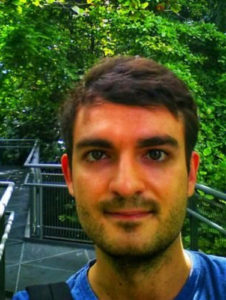- ...
Postgraduate Studentships - Search for funding opportunities.

 Adrián Magaz is a bioengineer by training, originally from Spain, and a postgraduate research student on the A*STAR PhD programme. This is a split-site programme that enables students to spend two years each in Singapore and Manchester. Below, he discusses his PhD experience in depth, from working in the labs here in Manchester to collaborating with scientists across the world in Singapore…
Adrián Magaz is a bioengineer by training, originally from Spain, and a postgraduate research student on the A*STAR PhD programme. This is a split-site programme that enables students to spend two years each in Singapore and Manchester. Below, he discusses his PhD experience in depth, from working in the labs here in Manchester to collaborating with scientists across the world in Singapore…
Why I chose the A*STAR programme
The split-site A*STAR PhD programme immediately appealed to me. It gave me the chance to experience life in a different part of the world whilst completing my PhD at two top research facilities.
My PhD project itself, in the fields of biomaterials and regenerative medicine, also greatly interested me. Reading about the project and talking to my potential supervisors, I immediately knew it was going to be a great fit considering my previous research background.
On the other hand, I knew I would get high-quality education at The University of Manchester and enjoy the wonderful life Manchester city has to offer. The University has world-leading research facilities, in particular the Biomaterials labs which are fitted out with state-of-the art equipment. Soon, we are also set to move to a new lab space at the Henry Royce Institute (the UK’s National Institute for advanced materials, research and innovation).
In addition, due to the multidisciplinary nature of my field of research at the interplay of biomedical sciences and engineering, there is close collaboration among research groups across the Faculties of Science and Engineering and Biology, Medicine and Health, which is great.
About my research
I work at the interface of materials science and cell biology and look to come up with new strategies to repair, replace or regenerate damaged human tissues.
More specifically, my PhD project is on electroconductive scaffolds for peripheral nerve repair. Commercially approved nerve conduits lack relevant architectural features and stimulatory cues, leading to differing biological responses compared with the healthy tissue.
The nerve tissue is electrically sensitive, and by making nerve scaffolds that are electrically conductive, the native tissue microenvironment could be better mimicked to enhance the repair and regeneration process.
My PhD experience so far
I spent two years living overseas in Singapore and working at the Institute of Materials, Research and Engineering (IMRE) at the Agency of Science, Technology and Research (A*STAR).
A*STAR is a great hub for science and new research. Learning how different labs work from countries miles away was really a bonus. It makes you more flexible, willing to question more and allows you to implement change from previous experiences.
Joining A*STAR was also a great opportunity to learn about new cultures and meet new people. I strongly believe that scientists have to share ideas and expand their mental horizons, and joining A*STAR was an excellent opportunity to do so.
I do not regret any second of it. A PhD has provided me with a valuable footing for research, and the ability to analyse complex data and simplify it to a wider audience. My project management skills have led to the publication of several research articles, and I have had the chance to disseminate my work at several international scientific conferences worldwide.
Spending time in Singapore and Manchester
Singapore has great infrastructures and invests heavily in technology, with tight ties with the industry sector. Singapore is also a melting point of cultures and an exchange point for different Asian countries. There are people from all over the world, and therefore such a variety of different foods.
Travelling is also one of my great passions and Singapore is very close to several countries in south-east Asia, so it was a great opportunity to do some travelling too.
Manchester is very laid back, a lively city brimming with character where you have the space to look at yourself and enjoy life. The Northern Quarter in Manchester is home to countless independent stores, vintage shops, cafés, bars and restaurants.
But if you need some fresh air and somewhere to clear your head and thoughts, Manchester is close to some of the most beautiful scenery in the country, with great hikes, forest walks, reservoirs, and breathtaking landscapes.
The future
I have been looking for a career that would allow me to remain connected to the forefront of cutting-edge science away from the lab bench, but that at the same time would allow me to make use of the skills and scientific training I have gained during my time working in world-class research environments.
While exploring new career paths outside academia, I came across the medical communications industry. During my studies here in Manchester, I soon learnt that the region was a hub for the industry, so I would like to work in medical affairs.

The University of Manchester is a centre of teaching excellence, world-class research, outstanding student experience, and social responsibility. Part...